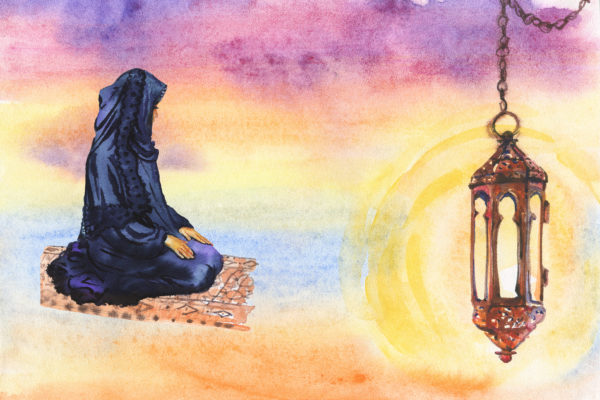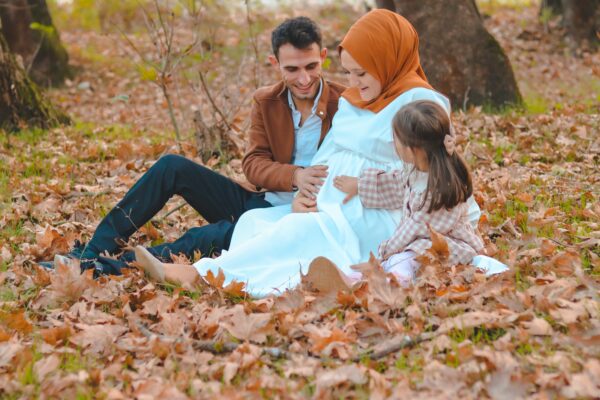Brazil is often seen as a cordial country – unless you’re a hijab-wearing working-class Muslim woman – a new study reveals.
Brazil is often seen as a cordial country – unless you’re a hijab-wearing working-class Muslim woman – a new study reveals.
Two months ago, Poliana Veiga de Souza, a 28-year-old Muslim convert living in Vitoria, Espirito Santo State, was at a bus stop with a friend after leaving the mosque when an unknown man appeared out of nowhere and began to shout at them. Both de Souza and her friend were wearing hijabs.
“He came in our direction saying that we were weak women, whose husbands are accustomed to cut off heads in their countries and wanted to do the same here in Brazil,” she recalled, describing that he apparently had a furious outburst only for seeing them.
After converting – or reverting, as she prefers to say – to Islam in 2017, that was the first time that she experienced such a threatening attack, she told Middle East Eye.
“He acted very violently and intimidated us. Since then, we are being escorted to the bus stop by the sheikh or another brother of the mosque every week,” she added.
A recently published study on islamophobia in Brazil – the first one in Latin America – showed that cases like de Souza’s are rather common among Muslim women in the South American nation.
The survey, carried out by the Anthropology in Islamic and Arab Contexts Group, led by anthropologist Francirosy Barbosa, showed that 73 percent of the female interviewees have already suffered some sort of aggression on the streets. Most of the attacks were verbal, but 10 percent of them report to have been physically assaulted.
Poor Muslim Women More Vulnerable
Barbosa, a professor at the Department of Psychology of the University of São Paulo in Ribeirao Preto and a Muslim convert herself, explained that Islam has been steadily growing in the country over the past 20 years.
New waves of immigration from Muslim countries and an increasing number of converts have been the central reasons for that phenomenon. Women have taken the lead in that process, with 70 percent of all conversions.
There are no reliable numbers concerning the size of the Muslim community, but it has been estimated by unofficial sources to be at least 700,000 people. Families of Arab origin continue to be the majority among them.
“Brazil is generally seen as a cordial country. But when it comes to islamophobia, it may only be cordial – if that is really the case – for women who come from a Muslim family, have a car, and live in a protected context,” Barbosa argued.
For Muslim women living in poor neighborhoods and using public transport every day, the risks are much greater.
“Reverted women are more socially exposed because they take buses and trains and walk on the streets,” explained Barbosa, adding that many of such women are workers and have African descent.
“So, that is a situation that involves class, race, and gender issues,” she explained.
Family Rejection
The adversities faced by women who convert to Islam in Brazil are manifold, Barbosa said. People like Poliana de Souza readily confirm that.
“It is not easy to talk about it, but when I reverted to Islam, the reaction at home was worse than the one on the streets. There has been much incomprehension during the first year,” de Souza described.
She said that her family did not know anything about Muslims, “only what is said by the media about them”.
“When I reverted to Islam, the reaction at home was worse than the one on the streets: – Poliana de Souza
“I had to deal with a lot of outrageous things that were said to me. I did my best to not respond and avoid more problems,” she recalled.
The study demonstrated that 42 percent of the converts had to face their family’s rejection of their new religion.
“That is connected to the way Islam is portrayed by the press, according to the interviewees,” Barbosa said.
According to Sheikh Ali Abdune, who heads the World Assembly of Muslim Youth in Brazil, “Muslims have been the victims of deceitful propaganda disseminated by the media for a long time.”
“Misinformation is so overwhelming that many people do not even know that Islam is a religion,” he lamented.
Abdune emphasised that many non-Arab Muslims have told him about cases of exclusion they suffered among relatives or at work.
“They are certainly more subject to discrimination,” he added.
Journalist Alice Barbosa has felt it many times. She moved to Mexico nine years ago but works mostly with Brazilians on the internet. An expert in basketball – especially on the sport’s referees – she is frequently invited to online talks and TV shows. But her hijab can be an obstacle.
“The discomfort of many people in Brazil when I turn on my camera is notorious,” she told MEE.
On different occasions, people cancelled her participation after noticing that she is Muslim and wears a headscarf.
“Once a person was very clear about it. People obviously choose words carefully, but we know the codes of exclusion,” she said
Muslims With No Hijab
That is why the decision to wear a head covering may be a long and difficult process for many Muslim women in Brazil. Poliana de Souza took three years after her conversion to decide to adopt it.
Maria Eduarda da Silva, a 24-year-old geography teacher in Recife, Pernambuco State, has been avoiding wearing a headscarf since she converted to Islam one year ago.
“That is a great step to take and involves much responsibility. Once you decide to wear it, you should never give up on it,” she told MEE.
As a public school teacher, da Silva must comply with an appearance code, she said. “Men cannot have long beards, for instance. So, I am afraid to wear a hijab while I am at school,” da Silva affirmed.
She said that a colleague of hers failed to get a position as an intern in a school due to her hijab – something that increased her fear.
“I only wear it when I am going to the mosque,” she said.
The mosque in Recife is mainly frequented by immigrants from Senegal, Egypt and Pakistan, but there are many converts. Da Silva is one of the members of a women’s group that gathers every month to discuss their specific problems.
“Many women have suffered attacks on the street. People can throw water at them or follow them in order to intimidate them,” she described. Recently, a psychologist visited the mosque and talked to the group about such traumas.
Eighty-three percent of the interviewees responded that they have suffered embarrassment due to their religion. Thirty-two percent of them do not wear a hijab every day.
Muslims As Enemies
The interviews were conducted in 2021, the third year of far-right President Jair Bolsonaro’s tenure. Since his presidential campaign, in 2018, the incumbent – who was defeated in his bid for re-election in November and will leave the presidency on 31 December – has been a strong ally of right-wing evangelical Christians.
Their growing social presence and political power has intensified Islamophobia in the country, according to Felipe Freitas de Souza, one of the study’s authors.
“Bolsonaro shared a video of a Muslim woman being stoned and criticised the idea of ‘a Muslim invasion in the West” – Felipe Freitas de Souza, researcher
“One of the results of Bolsonaro and his backers’ identification as members of a western and Judeo-Christian tradition has been the definition of Muslims as enemies,” Freitas de Souza, a doctoral candidate in Social Science at the São Paulo State University, told MEE.
He emphasised that there were several incidents of Islamophobia during the campaign and after Bolsonaro took office.
“On his fifth day as the new president, Bolsonaro shared a video of a Muslim woman being stoned and criticised the idea of ‘a Muslim invasion in the West’,” recalled Freitas de Souza, who converted to Islam 12 years ago.
The rise of the evangelicals in Brazil is not new. In fact, there has been a consistent growth in their numbers over recent decades. But the confluence of many of their segments with the right-wing is a recent phenomenon, which coincided with the adoption of Israeli symbols by many Pentecostal and Neo-Pentecostal churches.
“Israeli flags can be spotted in evangelical temples all over Brazil now,” he affirmed, adding that many of such groups believe that the Messiah can accelerate his second coming if the Jewish people regain full control of the so-called Holy Land.
For them, the Palestinian issue has no historicity, Freitas de Souza argued, and Palestinians are only seen as enemies. “Those ideas collaborate to normalise violence and Islamophobia,” he reflected.
It is not a coincidence that most Muslims in Brazil consider that evangelicals are the religious group that discriminates against them the most: that is true for 73 percent of the Muslim women interviewees. Many of them face such a reality at home. Several reports of evangelical relatives who humiliate Muslim converts appeared in the study.
Muslim Community Criticised
Both Francirosy Barbosa and Felipe de Souza affirm that the Muslim community in Brazil has not been very cooperative when it comes to protecting the victims of Islamophobia, especially when they are women converts.
“Most Muslim leaders in Brazil prefer to talk about religious intolerance, believing that ‘Islamophobia’ is a too negative term and may make things worse,” Barbosa reflected.
There is also a component of xenophobia in that problem, she added.
“The Muslim communities failed to build representativeness. Most of them are hegemonically Arab and fail to include women, Blacks, and poor,” Barbosa argued.
The result is that working-class women who live in the poor outskirts of Brazilian cities do not feel represented – nor protected – by community leaders.
The researchers interviewed 653 Muslims. Most of the people who agreed to participate were women. For Barbosa, that is a sign that they feel an urge to denounce what they have been going through.
“Violence is provoking serious consequences for their mental health. Many of them complained about depression, sadness, and low self-esteem,” she said. Many end up distancing themselves from their faith.
“We cannot maintain a denialist attitude and just pretend that Islamophobia does not exist in Brazil,” Barbosa concluded.
This article was first published in the Middle East Eye.





